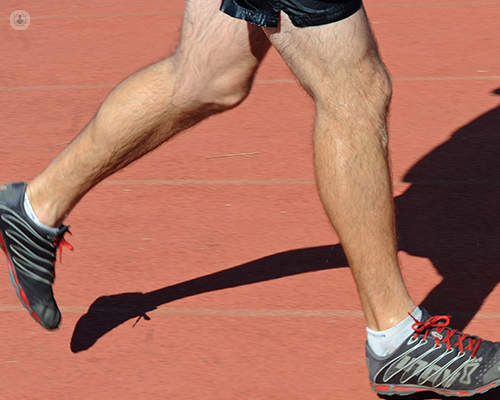What are the main causes of knee pain?
Written by:The knee is a large and complex joint, making it susceptible to injury and long-term damage. Indeed it is estimated that approximately 25% of adults over the age of 55 suffer from knee pain. Orthopaedic surgeon Mr William Bartlett explains more...
What are the main causes of knee pain?
Knee osteoarthritis is very common and is simply due to “wear and tear” of the joint surfaces. The condition causes pain with weight bearing and movement together with stiffness and swelling. Another common cause of knee pain in adults is a torn meniscal cartilage. Unlike the discomfort of osteoarthritis that takes months to develop, pain due to a meniscal tear may come on suddenly and can literally stop a person in their tracks. In young adults, sports injuries such as tears to the knee ligaments or muscular sprains are more common. It is also always worth remembering that pain in the knee may be referred from a damaged hip joint or even a spinal problem.
What are the alternatives to knee surgery?
The majority of knee complaints do not require surgery and can be successfully managed with a period of rest and subsequent guided rehabilitation. After clarifying the diagnosis (usually with X-rays and an MRI scan), it is sensible hold-off surgery for a few months. Of course, the prognosis depends on the exact problem in the joint but most people benefit from gentle exercise, weight-loss and short-term use of pain-killers and anti-inflammatories.
What happens during knee arthroscopic surgery?
Whilst many knee complaints will get better with time, if pain or instability continues, it may be sensible to undertake surgery. Thankfully, many knee operations can now be performed through small “keyhole” incisions.
During keyhole (arthroscopic) knee surgery, small instruments and a telescopic camera are introduced into the knee through two incisions approximately 5mm in length. Patients are given a short general anaesthetic and the procedure usually takes about half an hour. Keyhole knee surgery allows a variety of procedures to be performed such as removing loose cartilage flaps, smoothing damage to the joint surfaces, repairing torn cartilage and reconstructing the knee ligaments. It is worth pointing out that although knee “washout” surgery was often performed in the past, keyhole surgery is unlikely to help if the knee is significantly arthritic.
What happens after surgery?
Once recovered from the effect of the anaesthetic, patients will practice walking with a physiotherapist and sometimes a pair of crutches are needed. Because the operation is minimally-invasive, patients are able to go home a few hours after surgery and are often well recovered after a week or two. A few sessions of physiotherapy will help restore muscle bulk and control. Often two small stitches are used to close the wounds and these are removed after about 12 days.
For any concerns about knee pain, book with a specialist.



